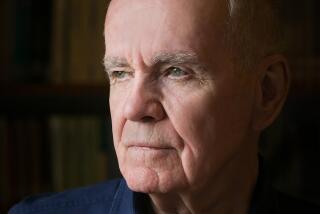Morley Callaghan; Canadian Writer, Hemingway Comrade
- Share via
Morley Callaghan, a highly respected Canadian writer who was a contemporary of Ernest Hemingway and F. Scott Fitzgerald, has died in Toronto. He was 87.
Callaghan’s son Barry, also a writer, said his father died on Saturday after hospitalization and surgery for an undisclosed illness.
The elder Callaghan’s novels included “The Loved and the Lost,” “They Shall Inherit the Earth,” “The Many Colored Coat,” and “A Fine and Private Place.”
His more than 100 short stories were published in major magazines including the New Yorker, the Saturday Evening Post, Harper’s Bazaar and Esquire.
Among Callaghan’s best known books was “That Summer in Paris,” an account of his friendship with Hemingway and Fitzgerald when they were living in Paris in the late 1920s.
Callaghan, who published three novels before he was 30, shared Hemingway’s and Fitzgerald’s editor at Scribner’s in New York, Maxwell Perkins.
Born in Toronto, Callaghan first became friendly with Hemingway in 1920 when Callaghan was still a student and working part time on the Toronto Star, where Hemingway was a seasoned reporter. When Callaghan moved to Paris in 1928, he again encountered Hemingway, who continued to encourage him in his literary efforts.
Callaghan was invited to box with Hemingway at the American Club in Paris, an event he later believed clouded his entire career.
Although four inches shorter than the 6-foot-tall, 200-pound Hemingway, Callaghan knocked him down. Fitzgerald was the timekeeper, and the furious Hemingway blamed him for deliberately letting the round go on too long.
Callaghan claimed that Fitzgerald became so engrossed in watching the fight he forgot to call the round at the agreed-upon one minute, suddenly exclaiming: “Oh, my God, I let the round go four minutes!”
The much-discussed incident led to tensions and estrangement of all three writers and caused Callaghan to lament in his later years: “I’m probably better known for boxing with Hemingway than for anything I’ve written.”
Although Callaghan was well received by literary critics, including Edmund Wilson, who likened his work to that of Chekhov and Turgenev, the Canadian writer felt he suffered by repeated comparisons with Hemingway and Fitzgerald.
He is survived by two sons, Barry and Michael. His wife died six years ago.
More to Read
Sign up for our Book Club newsletter
Get the latest news, events and more from the Los Angeles Times Book Club, and help us get L.A. reading and talking.
You may occasionally receive promotional content from the Los Angeles Times.









